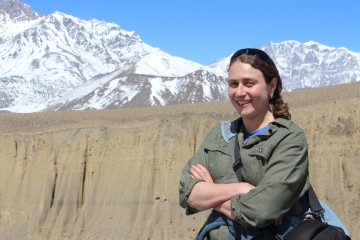IRES Seminar Series
Time: 12:30-1:30 pm
Location: AERL Theatre (room 120), 2202 Main Mall
The Properties of Territory and Terrain: Himalayan Belongings after the 2015 Earthquakes
Sara Shneiderman, Assistant Professor in Anthropology and the Institute of Asian Research
Abstract:
This presentation explores how natural disasters such as earthquakes reshape human experience, drawing upon long-standing ethnographic research in areas of Nepal deeply affected by the Spring 2015 earthquakes. To do so, we must engage with the locality of terrain: Where are the landslide zones? Which road is passable? Where has the water source been dammed? But at the same time, humanitarian responses rely upon national and transnational networks, with flows of money and information mediated by the politics of territory and sovereignty: Who can raise funds? Where will they be deposited? Who is responsible for ensuring consistent needs assessment across the disaster zone, and organizing coordinated responses? Taken together, these questions begin to suggest how people affected by such events are compelled to reorient practices of place and belonging in relation to suddenly changed landscapes, both environmental and political.
This work-in-progress presentation joins my ongoing research about state restructuring in Nepal and Himalayan notions of “territory”—a concept that in English links the multiple scales of individual land-ownership, communal emplacement in locality, and belonging and ownership of sovereign space at the national level—with recent firsthand observations of life in Nepal’s central-eastern Dolakha district after the earthquake. I welcome feedback as I work toward developing new frameworks for analysis that can accommodate both place and resource-based understandings of such dynamics and sociocultural ones.
Bio:
Sara Shneiderman is Assistant Professor in Anthropology and the Institute of Asian Research at UBC. A socio-cultural anthropologist working in the Himalayan regions of Nepal, India, and China’s Tibetan Autonomous Region, her research explores the relationships between political discourse, ritual action, and cross-border mobility in producing ethnic identities and shaping social transformation. She is the author of Rituals of Ethnicity: Thangmi Identities Between Nepal and India (University of Pennsylvania Press, 2015). Current research projects include an ethnography of “post-conflict” state restructuring in Nepal, with a focus on citizenship, territory, and religiosity, and an exploration of trans-Himalayan citizenship across the historical and contemporary borders of India, China, and Nepal.
